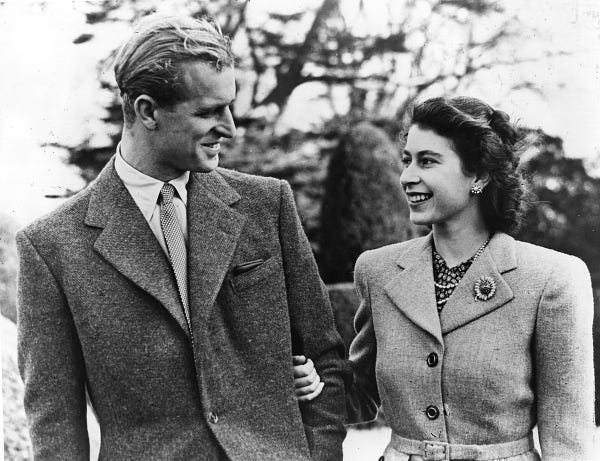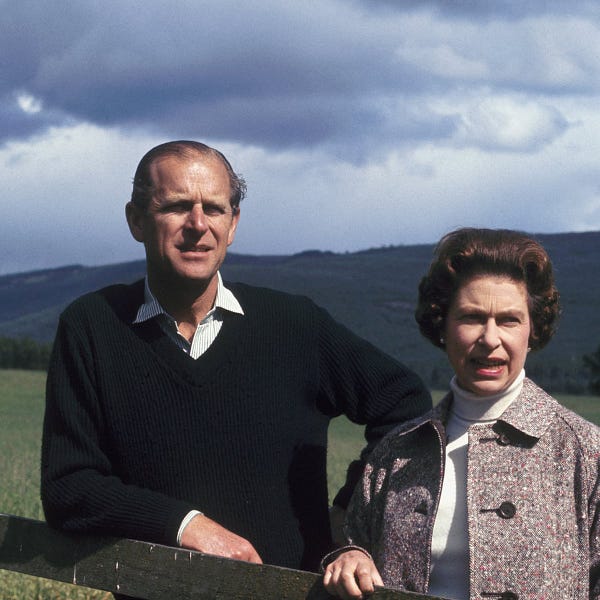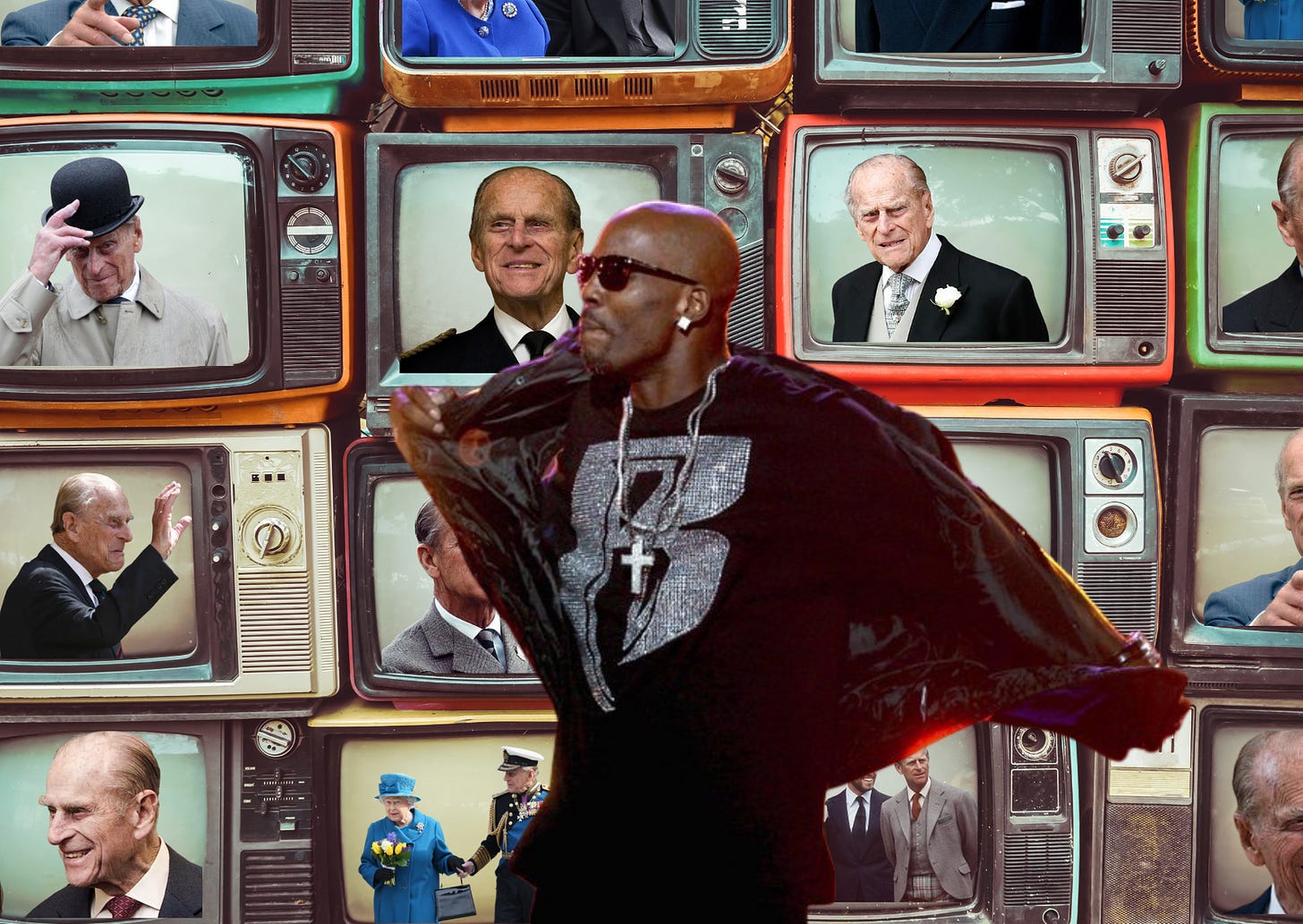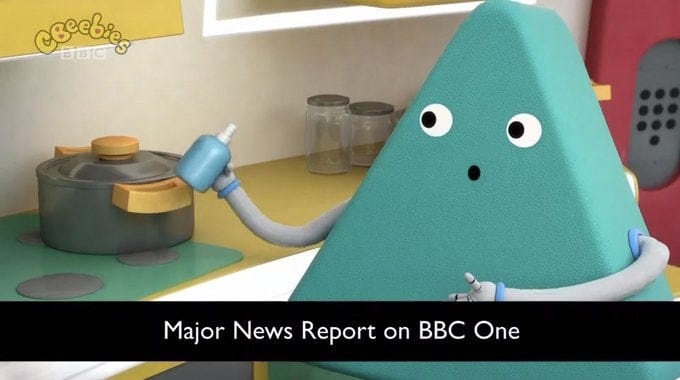Bullshit & Vine: Complacency, complaints and why the BBC’s royal coverage wasn’t about serving the public...
It was for a much smaller audience — the culture warrior government that wants to kill the licence fee.
As the digital billboards filled with Prince Philip’s face and the BBC turned its TV channels to simulcasting tributes to the recently deceased Duke, the corporation’s radio stations too turned to broadcasting tributes or, in the case of Radio 1, a special ‘mournful’ music playlist. ITV followed suit, with only Channel 4 sticking to its scheduled programming with a few small tweaks.
The result? Gogglebox was Friday’s biggest show with an audience of 4.2 million tuning in while BBC2 — which was turned over to playing the same thing as BBC1 — drew an average of just 340,000 between 7 pm and 11 pm. BBC4 was switched off entirely and replaced with a message urging viewers to switch to BBC1 — less appointment viewing and more viewing by edict.
BBC4 had been due to show the England women’s football team in an international friendly against France, but that game was instead broadcast on iPlayer. Because somehow showing it on BBC4 would be one less respect for the great big tear-filled totaliser?
The Observer reports that even more ridiculous situations were occurring in other parts of BBC:
Some BBC radio cricket commentary teams continued to provide coverage of county cricket – one of Philip’s favourite pastimes – unaware that no one was able to hear them. Even the live blog was shut down.
Meanwhile, on CBBC and CBeebies banners encouraged children watching their favourite shows to switch over to the news. Nothing says an easy bedtime like explaining why an old man your five-year-old has never heard of said so many racist things and wore so many ridiculous hats.


The BBC received so many complaints about the coverage that, for a time, it provided a dedicated page to streamline the process. It has subsequently removed that page and switched back to the fuller form it usually uses.
The Guardian’s Martin Belam was the new media department producer on the BBC Complaints website back in 2005 and wrote on his personal blog yesterday:
…it caught my eye that the BBC have been receiving such a volume of complaints about coverage of the death of the Duke of Edinburgh that they’ve made a special promo for it to streamline the process.
It’s the kind of thing that is, on the one hand, decent UX: you’ve streamlined the process for the user.
And incredibly annoying, because you find that what they are actually doing is simply harvesting a big long list of emails to presumably send a bland response to in a couple of weeks time, so you can find loads of people angry on social media that they couldn’t leave comments and that their complaint will essentially not be read by anyone at the BBC.
As Martin notes, it’s also being seized upon by those who find any reason they can to attack the BBC — the bedwetting astroturf arseholes at the Darren Grimes adjacent ‘pressure group’ Defund The BBC:


Reaching that angle required such contortionism that the lusty lads at Defund… are planning on taking their new circus act on the road.
The fact that it is once again getting shot by both sides will no doubt lead the BBC to conclude that it has “got it about right” as it does any time its output is criticised. It reached the same conclusion over BBC News’ handling of Brexit and the 2019 general election. But that’s a smug and self-deceiving logic.
The BBC has two big problems when it comes to this issue:
It’s always fighting the last war; it still remembers being burned by the right-wing press for being insufficiently reverential after the death of the Queen Mother in 2002, when Peter Sissons’ ‘disrespectful’ tie choice generated days of outrage.
The true audience for its over-the-top output on the death of Prince Philip was not the public but those right-wing news outlets and the right-wing government they served. The Director-General, Tim Davie, himself a former council candidate for the Conservative Party, is desperate to avoid further cuts and the outright culling of the Licence Fee so bends over backwards to acquiesce to the Tory worldview.
Saying, “the BBC can’t win” is too easy a conclusion. The BBC isn’t even on the battlefield. It retired injured some time ago and is now limping along on a sort of auto-pilot. Plans for covering a royal death that were formulated in the wake of Princess Diana’s passing in 1997 and the Queen Mother’s death in 2002 aren’t fit for purpose in the streaming age.
What the BBC could (and should) have done was dedicate BBC1 — the channel people turn to during major events — to its coverage of Prince Philip’s death, simulcasting that output on the BBC News Channel. It could have then kept up a more normal schedule on BBC2 with regular reminders of where the royal news was being extensively covered.
In that more modest approach, it could have then kept BBC4 on-air, used only Radio 4 and 5Live for broadcasting the tributes, and allowed the music stations to broadcast as normal. Acting as though the audience had no other options and smartphones had never been invented was a particularly poor strategy.
Of course, the death of the Queen will be different; it will be a more politically and culturally resonant event. And the BBC shouldn’t make its usual mistake of applying the ‘lessons’ from this week’s decisions then. But with a Director-General whose roots are in the corporation’s commercial operations and whose soul rests with the Conservative Party, it seems grimly inevitable that the BBC will find some new way to fuck up.

You might have thought that Chris Addison, a man who has appeared on the BBC many times, wouldn’t make the mistake of calling the corporation the “state broadcaster”. It’s not. It’s a public-sector broadcaster.
That the BBC has — from as far back as the General Strike of 1926 — often been subject to the whims of the government is a feature of our broken system and not of the intrinsic design of the corporation.
Addison also leans on the idea that the BBC was sticking to “protocols worked out over decades” but that’s idiotic. As I’ve already said, the broadcasting landscape has changed vastly in the 19 years since the last major royal death. The BBC has been caught flat-footed again, unable and unwilling to serve its whole audience despite having more radio and TV channels at its disposal.
The comedian’s tweet is a classic example of almost getting it. He’s right to say we live in a stupid system but maddeningly wrong to just sort of shrug and mutter, “Well, what can you do?” His view plays into a wider argument by lazy centrists and frothing gobshites on the Right that critics of the coverage should shut up as it’s not the right time. But it will never be the right time.
If we don’t challenge the wholesale turning over of the nation’s airwaves to an engineered mourning while it’s happening, we’ll never have the debate. Bring it up later and you’ll simply be told, "Oh, that’s over and done with, we’ve moved on to other things.” See how long the BBC sits on that pile of complaints it’s received and how automated the response is when it finally arrives.


Jeremy Vine’s interjection into the debate is far worse. He’s one of the country’s most well-known broadcasters and, despite his cesspit Channel 5 show, still a BBC contributor with a major show on Radio 2.
Was the blanket coverage on TV and radio not enough? Wasn’t it sufficient that the story was splashed by every single national and local newspaper? Or do all dissenting voices have to shut up too?
It’s a grim perspective for someone like Vine to put forward and it reveals once again the paper-thin nature of BBC ‘impartiality’. The truth is you don’t have to be impartial if you say things that would receive hearty nods of agreement in a Daily Mail news conference.
From The Daily Mail’s 144-pages bumper issue (with “magical souvenir magazine”) to The Sun’s 51 pages on the story (including a 24-page pullout) and The Daily Telegraph’s explosion of supplements and supplication, the print press went all out to convince us that this was “the mood of the nation” and that we are a “nation in mourning”. But the complaints say otherwise.
Of course, there are still huge numbers of monarchists in Britain — this is, after all, the most curséd of islands — but it’s apparent that there are more and more people who are willing to stand up and say that the bootlicking and bizarre levels of deference don’t represent them. It’s a shame they don’t have a media willing to reflect that.
The spin on the BBC complaints story in the right-wing press will focus on a cabal of commies, lefties out to attack our beloved Queen in her most desperate hour, but a fact in The Observer’s report shows another side to it:
By late Friday afternoon there was one death dominating the most-read stories on the BBC website: that of the rapper DMX.
But if you’re looking for a balanced perspective on the monarchy, neither BBC News nor The Daily Mail are gon' give it to ya…




